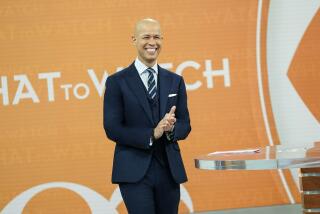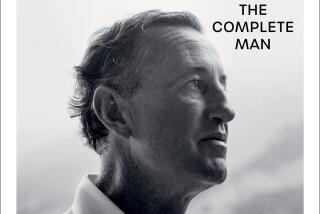‘Military Expert’ Has a Gap in His Credentials : Broadcasting: Andy Lightbody has claimed a background he doesn’t have, but several media employers have expressed satisfaction with his work.
When events in the Persian Gulf sent local broadcast outlets scrambling for “military experts,” Andy Lightbody was in the right place at the right time.
A stocky, bearded, 37-year-old Irvine man with a distinctive tenor voice, Lightbody had been reporting regularly since 1987 as military and aerospace editor for KNX-AM (1070) radio in Los Angeles and was hosting a show on cable’s Financial News Network. He had made 2,100 radio and television appearances, according to his 10-page resume, and had been quoted in numerous publications, including The Times.
Then he really got busy. Some days during the Gulf crisis, Lightbody was heard almost hourly on KNX, as well as on other CBS radio network stations around the country. His rapid-fire observations were picked up by Fox’s KTTV Channel 11, where he was seen nightly during the war.
Even before the Aug. 2 Iraqi invasion, Lightbody had enough work to sign with the William Morris Agency in New York and the Walters International Speakers Bureau of Pasadena, one of the largest in the country. He now averages five speeches a month at $2,000 each, mostly to defense and aerospace industry groups such as Rockwell and General Dynamics.
Lightbody’s accomplishments are even more striking in light of the fact that he lacks the academic and military credentials he has claimed.
While he is described in promotional literature as an “investigative reporter,” his journalism career is based largely on picture books and magazines--some published by his father-in-law--full of Pentagon and defense contractors’ handouts.
Similarly, his half-hour Financial News Network show, “High Tech News,” which repeats four times weekly, often features photographs, models, video and animation from defense contractors and company representatives.
Although Lightbody has claimed at various times to be a graduate of Loyola University and a former Air Force officer, he is neither, records show. He attended Loyola, but his only college degrees are from the University of Beverly Hills, a defunct, never-accredited institution; his military record consists of three years as an ROTC cadet (“technically, he was never in the service,” said Ralph W. McCann, chief of the Air Force Reference Branch of the National Personnel Records Center in St. Louis), and his highest aviation certification is a student pilot’s license.
In recent interviews with The Times, Lightbody acknowledged that he may have “erred” on these points in resumes, books and in an earlier taped interview. He said that listing the Loyola degree in one of his books was an error, but he did not explain why he claimed to be a Loyola graduate in the earlier Times interview. The status of the University of Beverly Hills, he said, “comes as a major shock to me.” He said that he left the ROTC program because “the Air Force violated its contract” with him, but he did not say why a resume submitted to one broadcast employer identifies him as “a former Air Force officer.”
But he insisted that none of this diminishes his credibility, and that he is not unlike any “beat” reporter in journalism who developed expertise on the job.
“The excellent relationship I have with the defense and high-technology industries, as well as the military, was never based upon where I went to school or military background,” he said in a written statement.
“I am self-taught,” he added, “thanks to thousands of books and articles I have read. . . . In addition, I have worked with and built sources and contacts in the military, the government and industry.”
While his reports are salted with phrases like “Pentagon people we talked to” and “we talked to several pilots,” he declined to provide any names of sources apart from military or contractor public affairs and media representatives.
Still, citing the many “second seat” flights he has taken in military aircraft and other vehicles, Lightbody said in the written statement, “I’m anything but an armchair reporter.”
Erik Simonsen, a public relations spokesman for Rockwell International familiar with Lightbody’s aerospace reporting, said, “I think he’s very articulate in that subject area, getting a lot of high-tech language across to the public in a way that’s understood. It’s nice to have someone there who can explain exactly what’s happening.”
Col. Thomas A. Hornung, head of the Air Force’s Western division public affairs office, has worked with Lightbody on a number of projects and said that he found him to be “very fair” and “very good at what he does.” He cited Lightbody’s “understanding of aerospace issues” and his training “as an Air Force pilot” as his strong points.
Informed of Lightbody’s military record, Hornung said he was surprised but that he nonetheless found Lightbody to be “very accurate in what he had to say about the Air Force.”
But some of Lightbody’s reporting skills have been called into question.
Lightbody produced at least nine books on military subjects in 1989 and 1990 alone for a Chicago firm called Publications International--mostly of the coffee-table genre, and filled with Pentagon and defense contractor photo handouts.
A source at the company who spoke on condition of anonymity said that the editorial quality of the books declined to the point that the company ended its relationship with Lightbody. It was possible, the source said, that Lightbody simply was spreading himself too thin with other commitments.
Lightbody says the firm ended its relationship with him in a dispute over money. But he acknowledges that the firm charged that there were “technical errors” in the books.
Meanwhile, just as he is reaching his highest level of recognition on local airwaves--and discussing the possibility of a daily slot with the CBS radio network--Lightbody is about to lose his most prestigious journalistic affiliation, with the Washington, D.C.-based Armed Forces Journal International as the publication’s “Field & Broadcast Editor.”
Lightbody’s contract with the magazine expires this month and was not renewed because of “budgetary constraints” prompted by the slowdown in the defense industry, according to the journal’s editor, Benjamin F. Schemmer.
However, there had been complaints about the accuracy of Lightbody’s published material, Schemmer said, declining any further details.
Schemmer said Lightbody had admitted to him on a number of occasions that he was largely self-educated in his field.
This self-education began in the late 1970s with automotive and outdoor publications in Orange County and Los Angeles, then shifted to military magazines. A decade later, Lightbody became military affairs director of Challenge Publications, a Canoga Park-based group headed by his father-in-law, Edwin A. Schnepf.
Challenge puts out such magazines as Air Progress, Military Airpower, Air Combat International Naval Review and International Military Review, packed with photographs from the Pentagon and military contractors and sold on newsstands. Articles for these magazines, written for “military buffs” rather than experts, frequently are sent to contractors for review before publication.
By 1984, Lightbody was spending a larger part of each month at the Pentagon in connection with the military magazines, attending regular press briefings with other journalists, and his interest shifted to broadcasting.
“I began to realize that there were a lot of people out there--reporters, in particular--doing broadcasts and writing stories about these military systems, and oftentimes they didn’t know very much about the subject,” he recalls. “And yet they were out there influencing peoples’ opinions about those things.”
He started, he said, “by picking up a telephone and calling a news director or two, or an assignment desk, and saying ‘Wait a minute, I heard this report about so-and-so, and there’s more to it than that,’ or, ‘He’s got the story wrong,’ or, ‘I can bring another facet to it, there’s some additional information you don’t know about.’ ”
Lightbody’s broadcasting breakthrough came in 1986, when he reported exclusively for KNX that aircraft wreckage found in the Sequoia National Forest north of Bakersfield was that of the then-super-secret Stealth prototype. Ultimately, the station, which had been taking Lightbody’s reports as needed, agreed to run him twice each weekday morning.
KNX news director Robert Sims said that he was aware that Lightbody lacked substantial academic and military credentials when he hired him, and that did not concern him.
He said he is not aware of any specific misrepresentations on Lightbody’s resume. If he learns of any, Sims said, “I would certainly want an explanation. I would be concerned if a person were trying to deceive me. . . .”
However, he added, “If (he) had a good explanation for something that was not vitally important to (his) ability to do the job, I could understand if that explanation made sense.”
In any case, regardless of Lightbody’s resume, “I’ve been quite satisfied with the quality of reporting he’s been able to do,” Sims said.
Sims did acknowledge that there have been a number of complaints--including some from former military pilots--about Lightbody’s reports, but he said they were “picayune kinds of things” dealing with terminology and technicalities.
Sims further said that he sees no conflict in Lightbody’s paid speaking engagements with defense and aerospace contractors, because the station has different standards for free-lance employees such as Lightbody than for staff.
When the crisis in the Persian Gulf heated up in August, Dick Tuininga, news director for Fox’s Channel 11, says he started “shopping around for someone with expertise about the military,” and Lightbody was recommended by someone at Fox who knew Lightbody’s work from KNX. Tuininga set up an interview and recalls being impressed by the military hardware books Lightbody brought, as well as by his tie to Armed Forces Journal.
Dick Tuininga, news director for Fox’s Channel 11, said the station checked Lightbody’s broadcast and magazine references, but not his education or military background. But the absence of such credentials, he said, “would have made no difference,” since the station hired other experts who did have such credentials.
“I feel he served us very well,” Tuininga said.
More to Read
The biggest entertainment stories
Get our big stories about Hollywood, film, television, music, arts, culture and more right in your inbox as soon as they publish.
You may occasionally receive promotional content from the Los Angeles Times.










